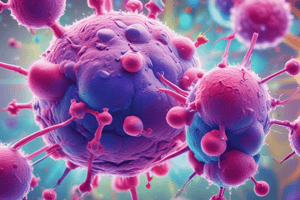Podcast
Questions and Answers
What is class switching?
What is class switching?
Lymphocytes change the type of immunoglobulin they produce upon exposure to antigen.
Which immunoglobulins can be produced as a result of class switching?
Which immunoglobulins can be produced as a result of class switching?
- IgG (correct)
- IgE (correct)
- IgA (correct)
- IgM
Class switching occurs in primary lymphoid organs.
Class switching occurs in primary lymphoid organs.
False (B)
What is the role of T cells during a parasitic infection?
What is the role of T cells during a parasitic infection?
What is the process of antibody manufacture?
What is the process of antibody manufacture?
What is an example of allotypic determinants?
What is an example of allotypic determinants?
Which immunoglobulin is most involved in opsonization?
Which immunoglobulin is most involved in opsonization?
What are pathogen neutralization and its role?
What are pathogen neutralization and its role?
Plasma cells are responsible for a low rate of antibody secretion.
Plasma cells are responsible for a low rate of antibody secretion.
Which immunoglobulin can cross the placenta?
Which immunoglobulin can cross the placenta?
What is transcytosis in the context of antibodies?
What is transcytosis in the context of antibodies?
What is a primary use for nonclonal antibodies?
What is a primary use for nonclonal antibodies?
The process of combining a B lymphocyte with a myeloma cell produces a __________.
The process of combining a B lymphocyte with a myeloma cell produces a __________.
Flashcards are hidden until you start studying
Study Notes
Class Switching
- Lymphocytes differentiate based on maturity and antigen exposure, leading to the production of various immunoglobulins.
- Changes from naive lymph (IgM) to lymphoblast, to plasma cell, determine the isotype produced: IgG, IgE, or IgA.
- Isotype switching occurs in secondary lymphoid organs (e.g., lymph nodes).
- After antigen contact, the variable region remains constant for antigen recognition, while the constant region changes based on the required isotype.
Class Switching in Parasitic Infections
- T cells respond to parasitic infections by releasing cytokines that stimulate B cells to produce IgE.
Antibody Manufacturing
- Antibodies are synthesized in the rough endoplasmic reticulum (RER), processed in the Golgi apparatus, then secreted.
- Immunoglobulins can be embedded in membranes or secreted into blood, depending on their function.
Allotypic Determinants
- Genetically encoded features which may lead to immune complications, e.g., maternal antibodies against fetal antigens can cause fetal death.
- Variations in antibody types can lead to destruction of Igs, necessitating genetic testing.
Antibody Structure and Functions
- Complement activation: IgM and IgG are primary, while IgA plays a minor role.
- Opsonization is mainly done by IgG, enhancing macrophage and neutrophil binding.
- IgM (minor) and IgA (major) facilitate transport across epithelial barriers.
- Key roles include neutralization of viruses (IgG and IgA are major players) and secretion (primarily IgG).
Antigen Binding Sites
- Multiple binding sites allow different species to engage antigens in varied manners.
- Different B cells can produce varying variable regions through isotypic switching, recognizing multiple antigen parts.
Roles of Antibodies
- Key in neutralizing pathogens via tight binding.
- Operate as a bridge between pathogens and phagocytic cells, enhancing opsonization.
- They recruit phagocytes through specific receptors and stimulate inflammatory responses via IgE.
Resting B Cells vs Plasma Cells
- Resting B Cells have surface immunoglobulins and MHC class II, with low growth and no secretion.
- Plasma Cells are characterized by a high rate of antibody secretion and active isotype switching.
Antibody-Mediated Effector Functions
- Opsonization enhances phagocytosis efficiency through antigen coating.
- Neutralization prevents virus binding, and the complement cascade produces C3b.
- Antibody-dependent cell-mediated cytotoxicity (ADCC) engages NK cells to recognize and destroy infected cells.
- Transcytosis facilitates the movement of antibodies across epithelial membranes (primarily IgA).
Nonclonal Antibodies
- Utilized in research and specific therapies by fusing lymphocytes with myeloma cells to create hybrid cells that produce identical antibodies.
- These clones are used for studying diseases and understanding immune responses.
Studying That Suits You
Use AI to generate personalized quizzes and flashcards to suit your learning preferences.




